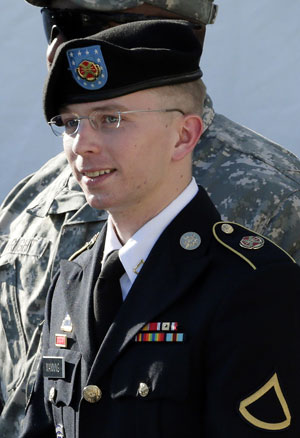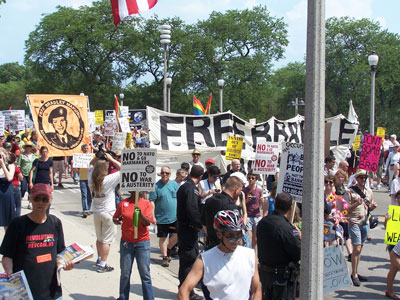Bradley Manning Trial Opens
Exposing War Crimes Is an Act of Moral Courage, Not a Crime!
June 6, 2013 | Revolution Newspaper | revcom.us

Bradley Manning. Photo: AP
The court-martial of Bradley Manning began on June 3 at Fort Meade, Maryland. Manning is charged with "aiding the enemy" for his alleged role in releasing computer files to the organization WikiLeaks. Many of these files exposed, for the first time, horrific war crimes committed by U.S. troops in Iraq and Afghanistan. For the alleged act of bringing to the world's attention the actual war crimes of his government and the army he served in, Bradley Manning is facing the possibility of many years, even life, in prison. He has already been jailed for over three years and subjected to almost a year of brutal, degrading torture by federal and military officials.
The trial of Bradley Manning is the most significant political trial in this country in many years. As a recent article on revcom.us said, "The continued sadistic persecution of Bradley Manning reveals much about the ways the U.S. coheres its empire, and the fearful, vengeful punishment it seeks to extract when it is exposed. Far from being the worldwide champion of such 'democratic values' as freedom of speech and freedom of the press, as the representatives of this system never tire of proclaiming, a look beneath the system's façade reveals a gruesome reality of murderous wars, atrocious war crimes routinely covered up, and harsh persecution of people who expose these crimes.
"The government is out to silence and shut down any individual or any media outlet that exposes the truth about crimes committed by the U.S. military. Anyone who wants to see truth revealed, war crimes exposed and stopped, and justice done must demand that the persecution of Bradley Manning be ended, his charges dropped, and that he be freed."
There is a place where epistemology and morality meet. There is a place where you have to stand and say: It is not acceptable to refuse to look at something—or to refuse to believe something—because it makes you uncomfortable. And: It is not acceptable to believe something just because it makes you feel comfortable.
Bob Avakian
Chairman of the Revolutionary
Communist Party, USA
BAsics 5:11
The prosecution said in their opening statement that Bradley Manning consciously and willfully put lives—American lives—in danger. "This is not a case about an accidental spill of classified information. .... This, Your Honor, this is a case about a soldier who systematically harvested hundreds of thousands of documents from classified databases and then literally dumped that information on to the Internet and into the hands of the enemy. Material he knew, based on his training and experience, could put the lives and welfare of his fellow soldiers at risk. This is a case about what happens when arrogance meets access to sensitive information."
The government is trying to portray Bradley Manning as an arrogant, depraved, criminal individual who "craved notoriety," and who "literally dumped" hundreds of thousand of documents "into the hands of the enemy."
In fact, as Manning's attorneys brought out in their opening statement, Manning is a human being of deep morality, compassion for any people who suffer injustice—not just Americans, great conviction, and the courage to act on that conviction. They described an incident on Christmas Eve 2009 in Baghdad that was a turning point for Bradley Manning.
Manning and other soldiers were elated when they learned that a convoy of U.S. vehicles they were monitoring had evaded explosive devices placed in the road. But soon after, a car with a family of five Iraqi people, two adults and three children, drove over the bombs. All were severely injured and hospitalized. One person died.

Bradley Manning continent at protest of thousands against the NATO summit in Chicago, May 2012.
Photo: flicker.com/savebradley
As the lawyer explained, "Everyone [in the Army barracks]...was celebrating. Everyone was happy. Everyone but PFC Manning. He couldn't celebrate. He couldn't be happy. The reason why is he couldn't forget about the life that was lost on that day. He couldn't forget about the lives and the family that was impacted on that Christmas Eve. And from that moment forward PFC Manning started a struggle.
"...His struggles led him to feel that he needed to do something, that he needed to do something to make a difference in this world. He needed to do something to help improve what he was seeing. And so from that moment forward, and that was January of 2010, he started selecting information that he believed the public should hear and should see. Information that he believed that if the public saw would make the world a better place. But importantly, information that he specifically selected that he believed could not be used against the United States. And information that he believed, if public, and everyone knew it, could not be used by a foreign government."
Bradley Manning came face-to-face with the monstrous horrors of the wars the U.S. was waging and the routine cover-up of these atrocities. As he said at a court appearance in February, "I believe that if the general public had access to the information, this could spark a domestic debate as to the role of the military and foreign policy in general. ...I felt I accomplished something that would allow me to have a clear conscience."
Hundreds of people rallied at Fort Meade in support of Bradley Manning at the beginning of his trial. Other events are being held across the world this week. An "I Am Bradley Manning" video challenges viewers to ask themselves what they would do if they had been in Manning's position, and to act in support of him now. Among the people it features are Alice Walker, Moby, Wallace Shawn, Maggie Gyllenhall, and Oliver Stone.
Debra Sweet, national director of World Can't Wait, told a reporter at the Fort Meade rally, "He [Manning] has given us a look inside the way this government bullies and pushes around whole countries, the way it has treated the Guantánamo prisoners, the way its treated other prisoners of war ... What is it that your government's doing? Torturing people! He said, I did this because I thought if regular people knew what their government was doing it would start a conversation."
Lawyers say the trial of Bradley Manning may last from 6 to 12 weeks. This "conversation"—and the fight to free Bradley Manning and to oppose the wars and atrocities he exposed—must continue and deepen. Revolution will have further coverage of this important trial as it develops.
If you like this article, subscribe, donate to and sustain Revolution newspaper.
